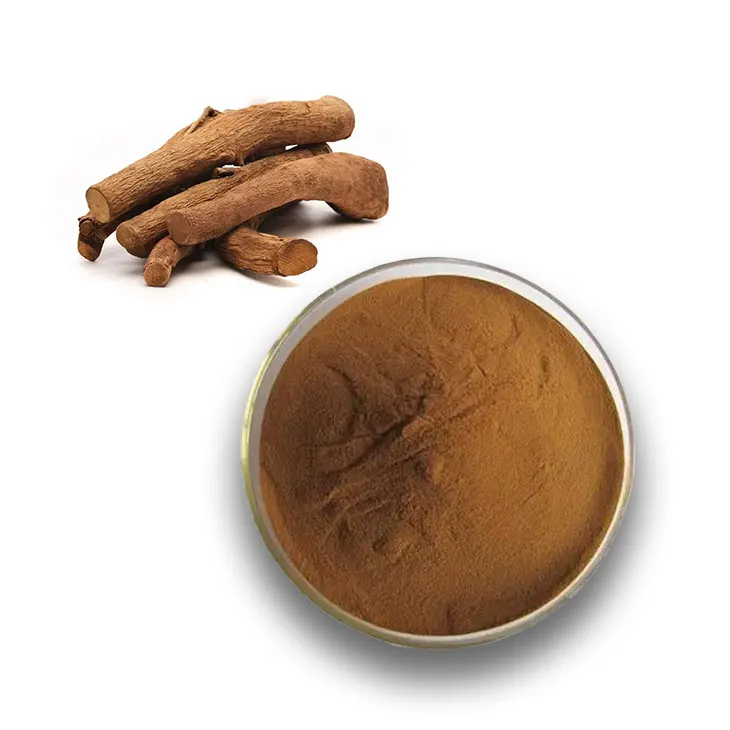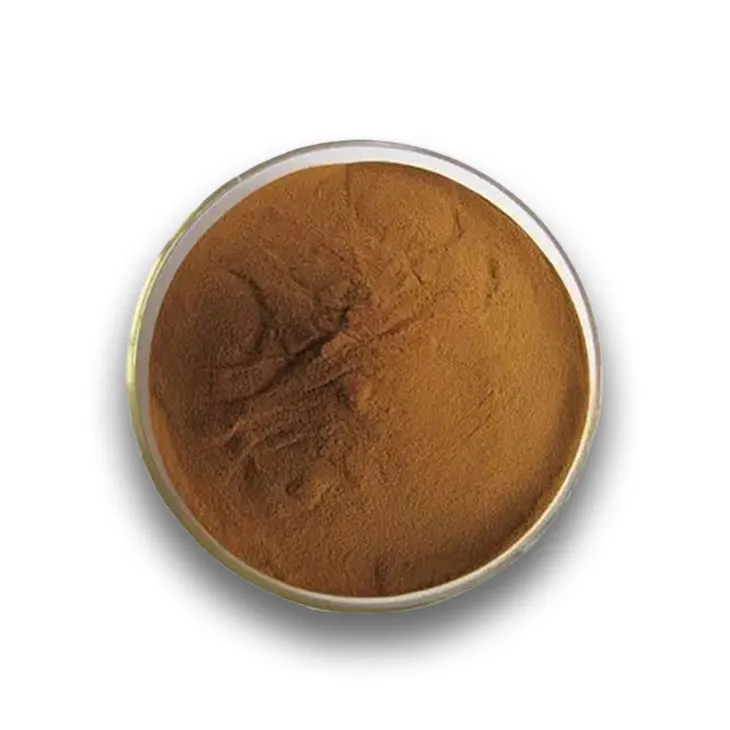- 0086-571-85302990
- sales@greenskybio.com
Tongkat Ali Extract: China vs. the United States.
2024-11-28

1. Introduction
Tongkat Ali Extract has become a subject of interest in both China and the United States, yet the ways in which it is perceived, studied, and regulated in these two countries are quite different. This article will explore these differences in detail.

2. Perception in China
2.1 Traditional Chinese Medicine Context
In China, there is a long - standing and deep - rooted tradition of using natural products for health - care purposes. Tongkat Ali Extract is gradually being incorporated into the traditional Chinese medicine - inspired health regimens. Chinese herbal medicine is based on a holistic view of the human body, emphasizing the balance of qi and blood, as well as the overall vitality.
2.2 Role in Health Regimens
Chinese herbal medicine practitioners may consider Tongkat Ali Extract as a potential supplement. They believe that it could play a role in enhancing the body's internal balance. For example, it might be thought to improve the circulation of qi and blood, which is crucial for maintaining good health. In traditional Chinese medicine theory, a smooth flow of qi and blood is associated with proper organ function, a strong immune system, and a good mental state.

3. Perception in the United States
3.1 Western Medical Paradigms
In the United States, the research on Tongkat Ali extract is more in line with Western medical paradigms. Western medicine typically focuses on the identification and treatment of specific diseases through scientific research methods. Tongkat Ali extract is studied for its potential role in treating specific medical conditions.
3.2 Specific Diseases Targeted
One of the main areas of research in the United States regarding Tongkat Ali extract is its potential in treating certain types of sexual dysfunctions. Some studies suggest that it may have an impact on hormonal balance, which could be beneficial for sexual health. Another area of interest is its potential role in treating metabolic disorders. For example, it may help in regulating blood sugar levels or lipid metabolism.

4. Regulatory Environments
4.1 China's Regulatory System
China has its own regulatory system for traditional medicine products containing Tongkat Ali extract. This system takes into account the unique characteristics of traditional Chinese medicine. The regulatory process focuses on ensuring the safety, quality, and efficacy of these products within the framework of traditional Chinese medicine theory.
For example, traditional Chinese medicine products are often required to go through a series of tests to prove their compliance with the standards set for ingredients, manufacturing processes, and quality control. Herbal medicine manufacturers need to follow strict regulations to ensure that their products are safe for consumers and effective for the intended health - care purposes.
4.2 The United States' FDA Regulations
In the United States, the Food and Drug Administration (FDA) has strict regulations governing the research, development, and marketing of Tongkat Ali extract. The FDA requires rigorous scientific evidence to support any claims made about the product's benefits.
Before a product containing Tongkat Ali extract can be marketed in the United States, it must go through extensive pre - market testing. This includes studies on its safety, pharmacokinetics (how the body absorbs, distributes, metabolizes, and excretes the substance), and efficacy in treating specific diseases. The FDA also monitors the advertising and labeling of these products to ensure that the information provided to consumers is accurate and not misleading.
5. Research Approaches
5.1 China's Research Approaches
In China, research on Tongkat Ali extract often combines traditional knowledge with modern scientific methods. Researchers may start from the traditional understanding of the herb's properties and then use modern techniques such as chromatography to analyze its chemical components.
Clinical trials in China may also be designed in a way that takes into account the holistic view of traditional Chinese medicine. For example, rather than just focusing on a single symptom or disease, they may look at the overall improvement in the patient's health status, including factors such as energy levels, digestion, and sleep quality.
5.2 The United States' Research Approaches
In the United States, research on Tongkat Ali extract is mainly based on the Western scientific model. This involves conducting large - scale, double - blind, placebo - controlled clinical trials to determine the effectiveness of the extract in treating specific diseases.
Researchers in the United States often collaborate with pharmaceutical companies and academic institutions. They use advanced laboratory techniques to study the molecular mechanisms of action of Tongkat Ali extract. For example, they may investigate how it interacts with specific receptors in the body or affects gene expression related to the targeted diseases.
6. Market and Consumer Acceptance
6.1 China's Market and Consumer Acceptance
In China, the market for Tongkat Ali extract - based products has been growing steadily, especially in the health - care and traditional Chinese medicine sectors. Chinese consumers are generally more receptive to natural products for health - care, especially those with a connection to traditional Chinese medicine.
However, consumer acceptance also depends on factors such as brand reputation, product quality, and price. Chinese consumers are becoming more discerning, and they expect products to be of high quality and backed by reliable scientific research or traditional knowledge.
6.2 The United States' Market and Consumer Acceptance
In the United States, the market for Tongkat Ali extract - based products is also emerging, but consumer acceptance is more cautious. American consumers are more accustomed to Western - style pharmaceuticals and are often skeptical of natural products without strong scientific evidence.
The marketing of Tongkat Ali extract - based products in the United States needs to comply with FDA regulations regarding health claims. This means that companies need to be very careful about how they promote their products to avoid making unsubstantiated claims, which could lead to legal issues.
7. Conclusion
In conclusion, Tongkat Ali extract is an interesting case study of how a natural product is perceived, studied, and regulated differently in China and the United States. In China, the traditional medicine context and holistic health view play a significant role, while in the United States, the Western medical paradigms and strict FDA regulations dominate. Understanding these differences can help both countries in further research, product development, and international cooperation in the field of natural health products.
FAQ:
1. How is Tongkat Ali extract incorporated into traditional Chinese health regimens?
In China, the use of natural products in healthcare has a long - standing tradition. Tongkat Ali extract is regarded as a potential supplement in traditional Chinese medicine - inspired health regimens. Chinese herbal medicine practitioners may consider its impact on qi and blood, as well as overall vitality, and incorporate it accordingly.
2. What are the differences in the research approaches of Tongkat Ali extract between China and the United States?
In China, Tongkat Ali extract may be studied in the context of traditional medicine concepts like its influence on qi and blood. In the United States, the research is more in line with Western medical paradigms, focusing on its potential role in treating specific diseases such as certain sexual dysfunctions and metabolic disorders.
3. How does the regulatory system in China affect products containing Tongkat Ali extract?
China has its own regulatory system for traditional medicine products containing Tongkat Ali extract. This system is designed to ensure the safety, quality, and proper use of such products within the framework of traditional Chinese medicine concepts.
4. What are the FDA regulations regarding Tongkat Ali extract in the United States?
In the United States, the FDA has strict regulations governing the research, development, and marketing of Tongkat Ali extract. These regulations are aimed at ensuring the safety and effectiveness of the extract when used for treating or preventing diseases.
5. Can Tongkat Ali extract be used for the same purposes in both China and the United States?
While there may be some overlap, in general, the uses are different. In China, it may be considered for overall vitality within traditional medicine concepts. In the United States, it is mainly studied for treating specific diseases like sexual dysfunctions and metabolic disorders.
Related literature
- The Potential of Tongkat Ali in Traditional Chinese Medicine and Western Medicine"
- "Regulatory Aspects of Herbal Extracts: A Comparison between China and the United States with a Focus on Tongkat Ali"
- "Tongkat Ali Extract: Research and Applications in Different Medical Paradigms (China vs. the United States)"
- ▶ Hesperidin
- ▶ Citrus Bioflavonoids
- ▶ Plant Extract
- ▶ lycopene
- ▶ Diosmin
- ▶ Grape seed extract
- ▶ Sea buckthorn Juice Powder
- ▶ Fruit Juice Powder
- ▶ Hops Extract
- ▶ Artichoke Extract
- ▶ Mushroom extract
- ▶ Astaxanthin
- ▶ Green Tea Extract
- ▶ Curcumin
- ▶ Horse Chestnut Extract
- ▶ Other Product
- ▶ Boswellia Serrata Extract
- ▶ Resveratrol
- ▶ Marigold Extract
- ▶ Grape Leaf Extract
- ▶ New Product
- ▶ Aminolevulinic acid
- ▶ Cranberry Extract
- ▶ Red Yeast Rice
- ▶ Red Wine Extract
-
Citrus bioflavonoids
2024-11-28
-
Mango flavored powder
2024-11-28
-
Black Pepper Extract
2024-11-28
-
Alisma Extract
2024-11-28
-
Moringa powder
2024-11-28
-
Sea buckthorn oil
2024-11-28
-
Tamarind extract powder
2024-11-28
-
Nutmeg Extract
2024-11-28
-
Europen Bilberry Extract
2024-11-28
-
Purple Sweet Potato Extract
2024-11-28





















